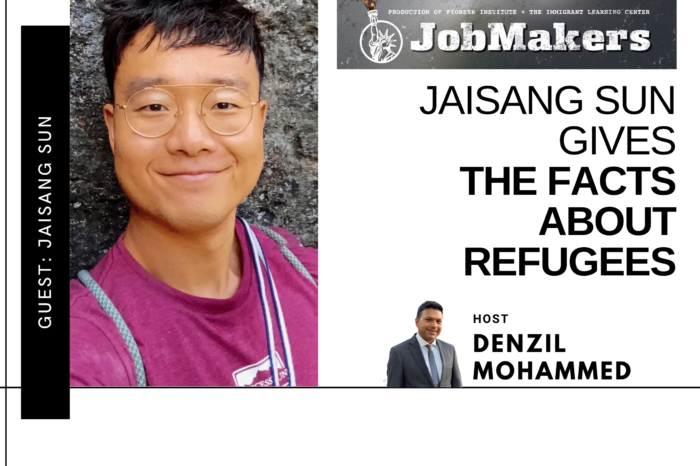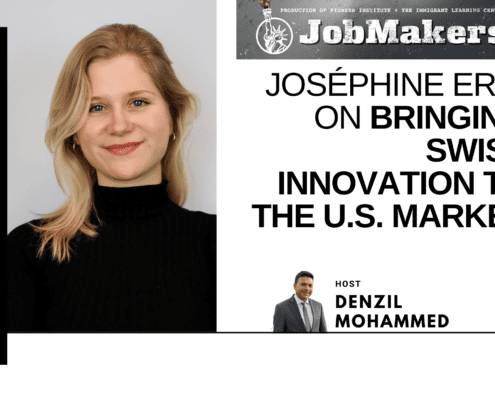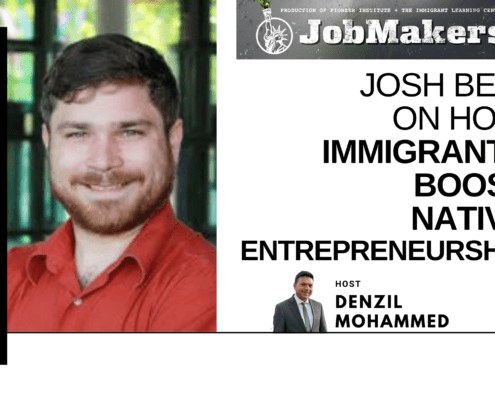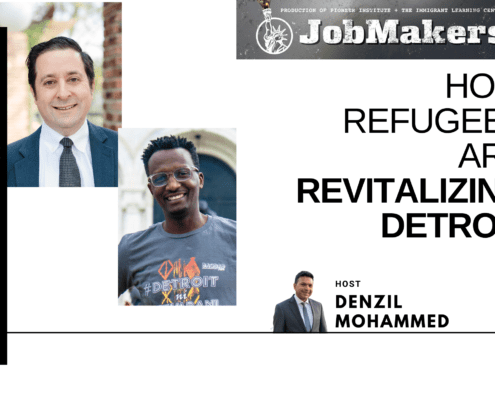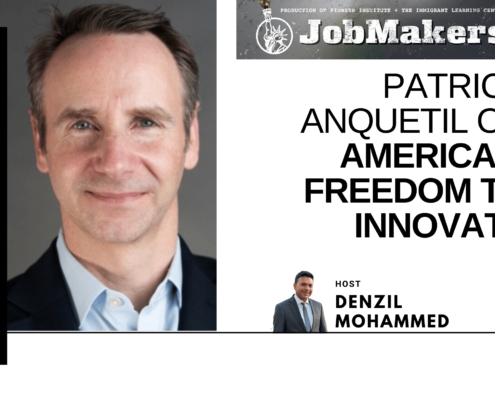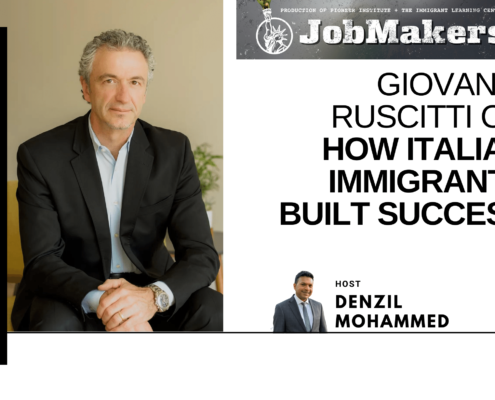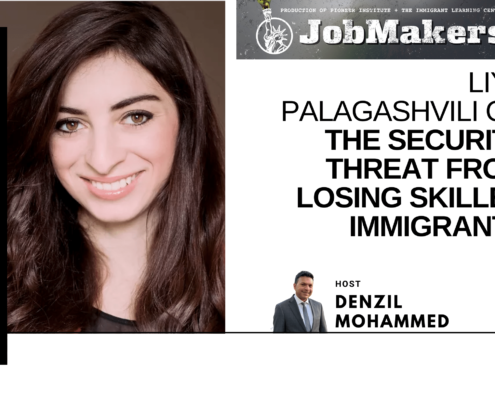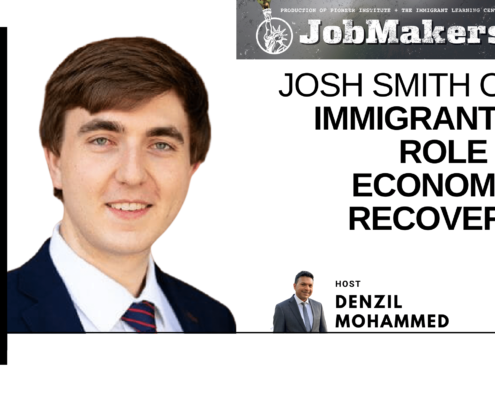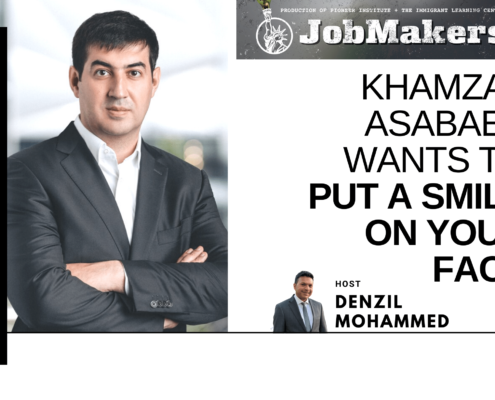Jaisang Sun Gives the Facts About Refugees
What do we know about refugees and the process of identifying, screening and resettling people from foreign lands who cannot go back home? For Jaisang Sun, research associate at The Immigrant Learning Center’s Public Education Institute, and the guest on this week’s episode of JobMakers, correcting misinformation and disinformation about refugees is paramount, especially today with the potential for an influx of refugees who assisted our special forces in Afghanistan and the consequent public discourse around it. Jai clears the air with JobMakers host Denzil Mohammed on refugees and the resettlement program, including costs and benefits to us, and more importantly, he profiles just who refugees are – people like you and me, except displaced and persecuted with nowhere to go, something many of us will never experience.
Guest:
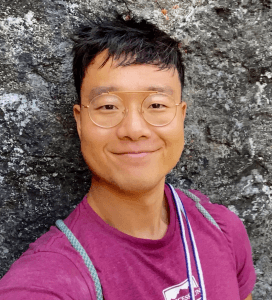 Jaisang Sun is research associate at The Immigrant Learning Center’s Public Education Institute. He is completing his doctoral degree at Syracuse University with research on the deportation of refugees from the U.S. His interests include transnational migration, diasporic nationalism, multiculturalism and refugee studies.
Jaisang Sun is research associate at The Immigrant Learning Center’s Public Education Institute. He is completing his doctoral degree at Syracuse University with research on the deportation of refugees from the U.S. His interests include transnational migration, diasporic nationalism, multiculturalism and refugee studies.
Get new episodes of JobMakers in your inbox!
Read a Transcript of This Episode:
Denzil Mohammed:
I’m Denzil Mohammed, and this is JobMakers.
Denzil Mohammed:
I’m sure you have an opinion on refugees, but how much do you actually know about them? What do you really know about the process of identifying screening and resettling people from foreign lands who cannot go back home for Jay sang some research associate at the Immigrant Learning Center’s public education Institute, the co-host of this podcast, correcting misinformation and disinformation about refugees is paramount, especially today with the potential for an influx of refugees who assisted our special forces in Afghanistan and the consequent public discourse around Jaisang, or Jai, is completing his doctoral degree at Syracuse university with research on the deportation of refugees, his interests include transnational migration, diasporic, nationalism, multiculturalism, and refugee studies. Jay clears the air for us on refugees and the resettlement program, including costs and benefits to us. And more importantly, he profiles just refugees are people just like you and me except displaced and persecuted has nowhere to go. Something many of us will never experience – as you’ll discover in this week’s job. Jaisang Sun, research associate at Immigrant Learning Center’s public education Institute – Welcome to JobMakers.
Jaisang Sun:
Thank you. Glad to be here.
Denzil Mohammed:
So refugees of course, have been in the news quite a lot recently. And your research at Syracuse has focused on refugees and the work you do as a research associate at the Immigrant Learning Center’s public education Institute looks at immigration broadly, including data and stories of refugees. Can you define what a refugee is and how that’s distinct from an immigrant?
Jaisang Sun:
Sure. A refugee can be defined as a person outside his or her country of nationality who is unable or unwilling to return to the country of origin or nationality because of persecution or a well-founded fear of persecution on account of race, religion, nationality membership in a particular social group or a political opinion.
Denzil Mohammed:
So it’s almost someone who’s pushed out of their home country, right?
Jaisang Sun:
Absolutely forcibly displaced.
Denzil Mohammed:
That’s really the distinction for an immigrant, which is someone who generally who chooses to move for some reason.
Jaisang Sun:
Yes. A lot of people attribute that agency to regular immigrants, whereas refugees would lack such agency to move about freely.
Denzil Mohammed:
So what kind of person is a refugee? Like what kind of qualities do you think they have or characteristics? What do they bring with them?
Jaisang Sun:
Refugees bring refugees are just like you and me. They are hard-working people, they are people with dreams and passion and goals. And you know, people who pursued happiness in their lives.
Denzil Mohammed:
But the kind of person who is forced to move to another place. And let’s be clear that move is not an easy move, right? It’s not as though they just get on a plane and land in Buffalo and they start a new life. It’s oftentimes they are forced to move to a neighboring country. They are in refugee camps sometimes for years on end, the stories of refugees from Vietnam who had to flee in the dead of night, be caught by pirates, be caught by security, thrown in jail. What are some of the journeys like?
Jaisang Sun:
I am not a refugee myself. So these are anecdotal evidences and stories that I have heard from others. But yes most of refugees’ journeys to safe resettlement have been very dangerous, treacherous. And the fact that they were displaced from home I think it presents enough challenge for anyone, but to make that journey to safety isI can’t even begin to fathom how difficult it may be
Denzil Mohammed:
And you bring up two important things. One is that they’re just like you and me. They just want to the lead regular lives. They want happiness. They want they have dreams, they have passions, but they’ve also been through something that is a life changing, something that is dangerous, some that’s treacherous life risking. And so I think of some of the refugees that I know personally, you know, person who cuts my hair, she tried to flee Vietnam 10 times as a teenager before she was actually successful. Each time she tried, she was thrown in jail. I think of Hong Tran who was interviewed for this podcast several months agowho in the process of fleeing Vietnam, they were attacked by pirates and his mother and baby sister were killed. And then they have to go on in these new countries to learn a new language, learn a new culture, learn new laws, trying to get an education what happens to refugees once they resettled in the U S
Jaisang Sun:
That’s an excellent question. Many refugees go through the resettlement processes, which have been streamlined as a result of the 1980 refugee act. Although different agencies do different things they are resettled and they’re asked to meet an economic self-sufficiency by getting a job very, very quickly upon their arrival to the United States
Denzil Mohammed:
Specifically to within two weeks.
Jaisang Sun:
Not necessarily two weeks. This data goes to show that most refugees once resettled are able to secure some form of employment within the two weeks of arrival.
Denzil Mohammed:
And that form of employment is generally not where their careers left off in their home countries, right? Cleaning Dunkin Donuts.
Jaisang Sun:
That’s right. You see doctors and professors and these people with professional degrees having to start their new American life as dishwashers and janitors and things that they have never really done before.
Denzil Mohammed:
And so what happens when a family gets settled in the U S – who determines where they go, who are the ones financially helping them out?
Jaisang Sun:
But during the initial journey that refugees make are partially funded by the state department through this international organization called the international organization of migration each individual is generally given a loan of about $1,100 so that they can make the journey over here. And after six months of arrival, they are expected to pay back and full amounts, although interest, interest free and full amounts of the money that they borrowed from the state department
Denzil Mohammed:
That the help that they receive in settling in and finding the job is learning a language. Those are generally done by nonprofits, right?
Jaisang Sun:
And most of those works are done by nonprofits and for decades, nonprofits have been the backbone of strengthening refugee resettlement programs within the United States, and also selling our model of doing refugee resettlement overseas to those countries that are just starting to pick up what it means to resettle refugees.
Denzil Mohammed:
So Jay, give us an overview of, of refugee policy in the U.S. It’s a fairly recent phenomenon, or did it start off much earlier than we think
Jaisang Sun:
It did start off much earlier than, than we think when most people think about refugee policies and refugee resettlement, we often jump to the 1980 refugee act, which is not entirely false, but someone actually argued that the history of refugee policies started long time ago. Some, some argue it started as early as the Mexican revolution when many, many people were displaced as a result of the revolution who are then admitted to the United States as refugees or given permanent residency. But certainly the modern refugee policies have its roots. And we can date back to World War II, wherein Jews and other minorities under the Nazi persecution, challenged the world with a massive global refugee crisis. The first instance of the United States’ policies on refugees was perhaps the presidential directive dated December 22nd, 1945 when president Truman authorized displaced, displaced persons and refugees to receive expedited admissions to the United States within the framework of the existing immigration laws at the time, which was largely based on the quota system of the 1917.
Jaisang Sun:
Now this directive allowed some 40,000 displaced person to enter the United States under the existing regulations. And it was considered a success on the very first instance of the specific refugee act. And then in 1948, the displaced persons act was passed and it was the very first specific refugee act,after WWII that allowed into address nearly 7 million displaced persons in Europe and the aftermath of world war two and allowed refugees to enter the United States within the quota system. Uneedless to say, because the immigration laws at the time, particularly the quota system and its roots in racism and segregation only accepted refugees of certain kind and national and ethnic backgrounds,notwithstanding its bias selection of refugees though. This act did admit more than 350,000 displaced persons into the United States in 1952, the immigration nationality act reorganized the existing immigration and nationality laws.
Jaisang Sun:
And although it maintained a quota system, it lacked it lacked the refugee specific provisions. So it allowed structurally for other ad hoc programs, including the Azorian refugee act of 1958 and the 1959-62 Cuban refugee program and the 65 Cuban air lift, ’62 Hong Kong parolee program, all of these ad hoc programs that were installed between 1952 and 1965. In 1965 amendments were made to the immigration and nationality act that tracked the adjustment of status for a lot of refugees that came in already in the United States. And then in in 1980 the refugee act of 1980 was passed overhauling, a lot of these ad hoc refugee programs and streaming streamlining a lot of the processes and administrative procedures to go about bringing in refugees on a more orderly fashion.
Jaisang Sun:
So describe for us the waves of refugees we’ve seen since 1980s since 1980. We’ve definitely seen a wide variety of refugees who entered in the United States that have strengthened our diversity and our commitment to humanitarianism in this country. But many of our refugee patterns follow that a lot of the refugee a lot of the crises that happened around the world at the time. So the, in the, in the eighties, we saw a lot more Cubans coming into specific corners of our countries and a lot of Indochinese refugees entering through the Pacific coast of the United States. And since then we have seen an increasing number of refugees from the continent of Africa and the middle Eastern region and
Denzil Mohammed:
Eastern Europe
Jaisang Sun:
As well. Right. Absolutely.
Denzil Mohammed:
So what you’re saying basically is that we’ve we’ve for very long time accepted refugees, no matter where they are in the world. At one point, there was a quota system that limited those admissions to an extent, but what is like, what is the responsibility of countries to accept refugees? Like, what is this rooted in
Jaisang Sun:
I would argue that it’s rooted in our commitment to humanitarian principles. The United States government signed a United Nations, high commissioner of refugees convention and the protocol, the protocol to it. And as, as early as the 1960s. So we are, you know, some may argue that we are simply following our promise to adhere to these international guidelines, which are deeply rooted in the humanitarian principles to never see crises like that we did in the aftermath of what we’re wanting and what we’re to
Denzil Mohammed:
Let’s bring it into Massachusetts. And Massachusetts is perhaps not widely known as a popular place to settle refugees, but we certainly have, and will continue to. So give us some stats about refugees and Massachusetts.
Jaisang Sun:
Absolutely. Since 2010 to Massachusetts total of 14,573 refugees resettled the top five countries from which refugees came from our Iraq with 3,849 people Butan which 2,725 people Somalia 1924 democratic Republic of Congo, 1576 people and Burma with 1,128 people. And they said there are different destinations within the state of Massachusetts, but we were able to identify Worcester, Lowell, Lynn, and Springfield to be the top destination for these refugees.
Denzil Mohammed:
What are some of the trends we see with refugees to the U S do they tend to, as you thought a little bit earlier about economic self-sufficiency what are some of the trends, financial and otherwise that you see with refugees?
Jaisang Sun:
Sure. there are different interesting facts and statistics and trends on refugees. For example, on average, refugees have shown to naturalize faster than any other lawfully, permanent, a lawful permanent residence. 66% of refugees who entered the U S during the period of 2020 10 or natural life became naturalized citizens. There are other statistics that, that look at employment of refugees. Studies have shown that refugee men specifically are in the workforce and higher rates than their American counterparts in terms of refugee economic self-sufficiency. We have to remember that refugees are because refugees goal refugee resettlement goal is to meet that economic self-sufficiency. There are almost incur very, they’re encouraged very much to find jobs very fast. And some studies show despite the fact that they are forced or they are encouraged to find jobs very, very fast. So there are a lot of studies that goes to show that it takes about on average, about seven years for an average refugee to reach that economic self-sufficiency. And again, the path to re the past to getting that economic self-sufficiency is not always very, very flowery for most refugees
Denzil Mohammed:
Describe that service, because I don’t think obviously most Americans don’t have a sense of what refugees, certainly what they’ve gone through in their home countries while being displaced after leaving their home countries. But can you just sort of guide us through in a very descriptive way, what it is like for refugee families once they settle here? Where did they go?
Jaisang Sun:
Absolutely. Refugee families, for example there are statistics that go to show that about 46% of refugees upon their arrival, are on food stamps. Needless to say, when they are receiving public benefits, as such as food stamps they don’t have much, they don’t have family members here. They don’t have friends or other networks that are giving them cash. They don’t have food, they don’t have toys for the children. So, in most instances, they don’t have the educational or the ability to seek opportunities that they may otherwise be completely eligible for. So every aspect of life is incredibly difficult for them. And not to mention because they are refugees who have experienced the varying degrees of persecution, many refugees suffer from either physical or mental disabilities. And many of them have shown to suffer from PTSD specifically. So refugee lives upon resettlement isn’t as perfect or only, you know, it doesn’t revolve around success stories only.
Denzil Mohammed:
And as distinct from other migrants. I know that for instance, this podcast is called JobMakers, and we look a lot at the immigrant entrepreneurs who have a higher than average rate of business generation, because I know for the immigrants overall, it’s about 11% and for refugees, it’s about 13%. So Jai, can you sort of speak generally as to what the impact of refugee resettlement in the receiving country?
Jaisang Sun:
Refugee resettlement is different than immigration, but the impact to which refugees have on our country and our communities are very, very similar. They enrich our diversity. They populate our cities. They bring in jobs, they become entrepreneurs. They become our partners, our family members, and they become Americans. So the impact refugees have on our country are not only very similar to immigrants, but the fact that they are able to overcome a lot of the hardships and the difficulties in making the journeys over here help us to help us to,
Denzil Mohammed:
I mean, I feel as though they enrich the resiliency of America.
Jaisang Sun:
Absolutely. They do absolutely, they bring examples, living examples of how to overcome, how to overcome these difficulties, how to be successful. And they provide a blueprint for our next generations to be this resilient generation of Americans who will lead our country and continue to help in the spirit of humanitarianism that we have been doing for the last decade.
Denzil Mohammed:
Is there anything else you wanted to add aboutabout refugees, there’s so much misinformation around refugees? Like if there are a couple of things that you wish would really be cleared up in the American public discourse on this, what do you think they would be?
Jaisang Sun:
Like you said, Denzil, there is so much misinformation regarding refugees, immigrants, refugee, resettlement, immigrant integration. There’s such a wealth of information online. One thing that I hope that the general population will look closely into is unfounded claims on refugees and immigrants. Like for example, refugees are people just like me. They bring hopes and dreams to this country. And statistics have shown that they reach success. They don’t reach success illegally. They don’t reach success through crimes. They reach success because they have grit. They have spirit of entrepreneurship with them just like you and me. So I wish, I hope that when looking for information online, people are able to see the true intent and, you know, the clear information that they can find that’s based on facts and empirical results.
Denzil Mohammed:
And I imagine that you will be coming up with some more of these facts and empirical results in your role as research associate at the Immigrant Learning Center’s public education Institute, whose mission is to educate Americans on the contributions of immigrants and refugees, and really to inform the discourse with facts, with nuance with stories. And, you know, we need to remind ourselves that this is a nation of immigrants, and at the same time, we’re the greatest economic and cultural powerhouse in the world. And we were enriched by all the different cultures and viewpoints and perspectives that have informed where we are today. Jaisang Sun, thank you so much for joining us on JobMakers.
Denzil Mohammed:
Jobmakers is a weekly podcast about immigrant entrepreneurship and contribution produced by Pioneer Institute, a think tank in Boston and the immigrant learning center of Malden, Massachusetts, a not-for-profit that gives immigrants a voice. Thank you for joining us for this. Week’s fascinating discussion on how immigrants and refugees together with the U S border make a better us. If you know someone, we should talk to email Denzel that’s D N Z I L at job makers, podcast.org. Leave us a review on your favorite streaming service too. I’m decimal Hammad. Join us next Thursday at noon for another job makers.
Recent Episodes:

